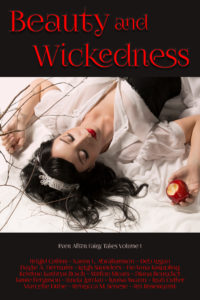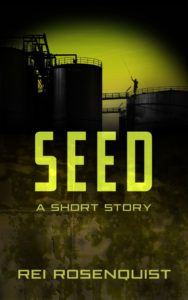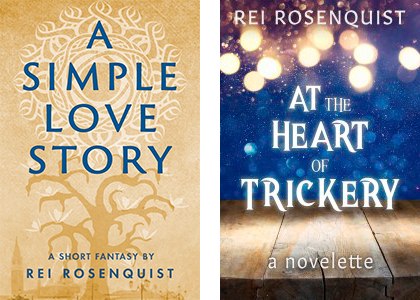Interview: Rei Rosenquist on “A Froth of Starry Sea Foam”

“A Froth of Starry Sea Foam” is in Beauty and Wickedness, the first volume in the anthology series Ever After Fairy Tales. In this collection, sixteen authors retell and reimagine some of the most enchanting fairy tales ever told – and make up some brand new fairy tales as well. Within these pages, you’ll find beauty and treachery, magic and courage, innocence and wickedness…and at least some happy endings.
Meet Rei!
Rei is a writer of speculative fiction, a barista, a baker, and a semi-nomad. They received a Silver Honorable Mention in the Writers of the Future contest in 2016.
“A Froth of Starry Sea Foam”
“A Froth of Starry Sea Foam” is a fairy tale about a white star nebula who embarks on a quest to find love.
…
“But, first,” Darkness paused importantly, “you must make a deal with me.”
“A deal?” What price could be too grand for this rare chance to dodge one’s own death and, in doing so, experience love?
“You must make one of those souls fall in love with you within the time of one full cycle of the Earth’s satellite—called the moon.”
“Fall in love?” the nebula asked, confused by these words.
True, the nebula had recently learned this word “love.” Love seemed infinitely good. And yet, how could one fall into it? As an asteroid into a planet, or a smaller star into a greater one. These concepts simply didn’t go together.
“But why should I make a soul fall? Into what?”
“Into you,” Darkness explained.
Make one of Earth’s soul’s warm glow fall into this gaseous body?
But, falling was bad. Spatial bodies fell into other spatial bodies. A passing asteroid would sometimes drag some gas tendrils down into itself. A binary system would collide, and the smaller star would fall in toward the larger, being eventually consumed. Whenever this “falling” happened, the thing falling was lost. Those atoms spun into nothingness, never to return.
“You misunderstand,” Darkness cut in. “It is a good thing on Earth.”
“How?”
“Humans fall in love and protect one another. They provide for one another. They support one another, hold the other up. Humans need love to live. To fall into it is to fall into the very thing that gives life.”
– from “A Froth of Starry Sea Foam” by Rei Rosenquist
The Interview
The main character in “A Froth of Starry Sea Foam” is a nebula, which is an interstellar cloud of gases and dust. What inspired you to write a fairy tale love story from a nebula’s point of view?
Although I’ve never been a research scientist myself, I am absolutely fascinated by all things science. I happened upon the field of astrophysics a couple years ago, and ever since, I have been utterly fascinated by what lies out in the furthest reaches of space. As a child, I was raised in a strict religious tradition that downplayed the importance of science for the sake of belief in a monotheistic god, and thus most of my early opinions of the natural world were skewed and inaccurate. Nowadays, when I stare up at the night sky, I often wonder what else have humans misunderstood about reality? As a fantasy writer, a fun way to explore this question is to personify a subject and see where the story takes me. For years, I was fascinated by the idea of personifying a nebula. Finally, when I was invited to write for Beauty and Wickedness, the retelling of an old fairy tale struck me as just the right story for this journey.
The two main characters (Neb, the nebula, and Wills) have different genders and pronouns. What is the distinction between the two forms in this story?
As Wills first indicates to Petra, Neb’s gender is unknown at the start. Wills doesn’t want to assume a gender, so ey use the gender-neutral “they” as a non-selective choice. However, once we re-enter Neb’s point of view, the gender-free pronoun fits best for how Neb feels. As a being outside of humanity and its gender roles and gender norms, Neb feels no personal association to such concepts. Later in the story, Orion is also referred to by the gender-neutral “they” for the same identity reason. Both nebulae would, if asked, identify as “agender,” which is a term that means “devoid of gender” or someone who simply doesn’t register gender as something to pay attention to.
On the other hand, Wills identifies as non-binary and chooses to use the pronouns ey/em/eir as a way to indicate their identity. Wills doesn’t use they/them/their because ey do feel and care about gender, as indicated by Wills strong attraction to both Ajax (who identifies as male) and Aria (who is portrayed in a very cis-female way). However, Wills’ identity doesn’t fit within the rigid lines of binary cis-male and cis-female, but rather it lies somewhere in the grey area of both/neither.
My goal in including these similar-seeming yet very different identities is to indicate to people who have no experience with such identities that there are many ways to be outside the gender norms of male and female. There are many identity expressions even within more open labels such as “non-binary,” “genderqueer,” and “genderfluid,” among others. Gender is extremely complex, and I feel the vocabulary of mainstream American English is still at the beginning stage of wrestling with new words to express just how complex it truly is. Part of the goal of this story’s pronoun usage is to give a helping hand to those lost in the waves of words.
“Seed,” which is set in your Broken Circle universe, received a Silver Honorable Mention in the Writers of the Future contest. What appeals to you about the gritty speculative future you’ve created for this group of stories?
 In truth, the Broken Circle universe was developed for a gritty science-fiction novel series I am currently working on. The world is a projection of my most pessimistic opinions of what the future of humanity currently holds. If the world we live in today doesn’t turn aside in some significant ways, the future vision of the Broken Circle could very well come to be. In writing this type of world, my goal is to post a black box warning to humanity. The Broken Circle universe itself cries out viscerally for help, and in experiencing that cry through the story, my sincerest hope is that when readers put the story down, they will feel compelled to turn inward and examine their own world. By shining a light on the darkest of futures, I hope is to bring more light to the here and now.
In truth, the Broken Circle universe was developed for a gritty science-fiction novel series I am currently working on. The world is a projection of my most pessimistic opinions of what the future of humanity currently holds. If the world we live in today doesn’t turn aside in some significant ways, the future vision of the Broken Circle could very well come to be. In writing this type of world, my goal is to post a black box warning to humanity. The Broken Circle universe itself cries out viscerally for help, and in experiencing that cry through the story, my sincerest hope is that when readers put the story down, they will feel compelled to turn inward and examine their own world. By shining a light on the darkest of futures, I hope is to bring more light to the here and now.
You call yourself a semi-nomad. What is it about travel that calls to you? Do the places you’ve lived in, and those you’ve visited, feature in your fiction?
Travel, for me, has been a way of life. My first memory is of the ocean through a hotel window. For me, packed bags are a sign of opportunity and arriving in a new place is a chance to grow and learn. I call myself “semi-nomad” because I find myself circling around to the same places where I set down a kind of root. These patterns are interspersed with going to entirely new places, but in truth, always landing somewhere new can be exhausting. So, as I’ve grown and listened to my own heart and body, I’ve found a deep peace in the return to places I love. Each time I return to one of these locations, it feels like opening the door to a well-worn and well-loved home.
Without traveling as I do, my stories wouldn’t be the same. Every time I go somewhere new, I find not just new details to add into stories, but an entirely new shape of narrative. I am inspired by different things in different places, and I am compelled to write different types of stories depending on the place and its people. Each location has its own narrative, I’d say, and tapping into that is what drives the stories inside of me. If I never traveled again, I feel I would write the same tale over and over again with the same perspective and the same ending. But, when the world shifts around me, so does my lens and the kinds of details I soak in.
In a more matter-of-fact way, I have stories set in future or fantasy versions of Tokyo, Osaka, Yamanashi, Kyoto, Lisbon, Paris, London, Venice, New York, Seattle, Portland, Waikiki, and many places that are a miasma of several real places. One thing I try to avoid is writing in length about a place I have never been
Why do you feel love stories are so important to tell?
Love, and the various ways people define it, is all about connection. That connection of hearts, of one being to another. That is what I think drives life forward. For my part, I think there is nothing as important as furthering, protecting, and upholding the cycles and patterns of life. As such, the most important story I can think to tell is a story of connection. One of deep sharing, giving and growing. That for me is a “love story.” It doesn’t always deal with romance or sexuality, but rather it looks at the question of how, where, when, and why do we connect? It demands big risks and takes many chances. And, in the end, it is the type of narrative that I truly believe can change the world. For without connection, we only end up in the same cycles of unsustainable choices which lead, ultimately, to death. On the other hand, reaching out our hands to one another with hope and trust, even if we think we aren’t strong enough, can save all manners of life.

You’re a baker! What do you enjoy about baking, and what are your favorite things to bake?
At its heart, baking is much like telling a good sci-fi or fantasy story. Each baked good like each character in a story has its own tale to tell. Both are made up of details and creativity. Just as each well-written character is entirely their own, so no two scones or loaves are bread are ever the same. The key to being a good baker is just like the key to being a good writer. First, one must learn all the rules. You must understand and internalize the nitty, gritty science of the act. You must take in and understand all the details that make the thing work well. You must try and fail. Then, once you’ve trained in good scientific habits, you do just like you do in writing – you take the rules and you throw them out. You internalize professor’s recipes and then, you burn them. You mix ingredients you’ve been told never to mix. You add in ingredients that should never fit together. You let bread proof too long, not long enough, not at all. You burn scones and see what that tastes like. And then, after all that wild experimentation – you begin to understand what your own creative sense is. And then, you train in those new skills by repeating the good ones, and eventually – you are making things no one else can make. Then, you have your baking story. And you can tell it with confidence and pride, sharing with the world your unique vision of what is good.
I’m not one for choosing favorites because I often find my preferences change frequently. However, currently, I am really into yeast starters. There is so much variety in things you can use to catch wild yeasts and so much that you can do with any single yeast to alter the flavor of bread! I love all the options and room for growth in my understanding.
What story (or stories) are you working on now, and what’s fun about what you’re writing?
Currently, I’m working on a long short story that’s a blending of European noir and Japanese anime “magic girl” genres set in a future version of Tokyo. This one should be out in the next couple months.
I’m also elbows deep in edits on the first novel of the Broken Circle Series, which will hopefully be ready for public release within the next year or so. But then, writing doesn’t like schedules so maybe I just cursed myself in saying that.
The funniest thing about writing I think is the process itself. Seeing a story start as a spark in my mind, some flickering little light that I often have to write down immediately or else it slips away. Then, that spark takes me on a journey through twists and turns, across bridges, climbing to staggering heights and stumbling through forests of the deepest dark. Then, once I have the heart of the story, the journey becomes one of making maps and charting out the territory I wandered across. I nit-pick and tear details apart. And at the end of this unforgiving surgery, what I have in front of me is a story: something I want to share with others who haven’t been along on this journey with me. At each stage, the process feels different and the outcome is always refreshing, and I think that’s what keeps me going. The newness of each new attempt and the shock of joy at the end of it when I get to share with others what I’ve poured my heart into. A kind of quiet, long-lasting love story all its own.
…
Rei Rosenquist is a queer agender (they/them) speculative fiction writer who depicts a wide variety of identities struggling to find a place in a wide variety of speculative worlds. They are also a lifelong barista, baker, and semi-nomad.
Rei first remembers life as seen out the high window of a hotel balcony. Down below is a courtyard, swarms of brightly dressed tourists, the beach. The memory is nothing but a blue-green washed image. Warmth and sunlight. Here, they are three years old, and this is the beginning of a nomadic story-teller’s life.
Over the years, they have traveled to many countries, engaged many peoples, picked up new habits, and learned new languages. But, some things never change. For them, these are stories, coffee, food and traveling. These three passions have bloomed from hobbies, studies, and jobs into a way of life.
These days, Rei can be found somewhere in between the Pacific Northwest, Hawaii, and Japan. There, you will find Rei cozied up with a laptop obsessively writing whilst intermittently pouring beautiful latte art, baking off a batch of famous savory scones, and sharing ideas on how homo sapiens sapiens can collectively make our awesome Earthship a better (not worse) place to live.
